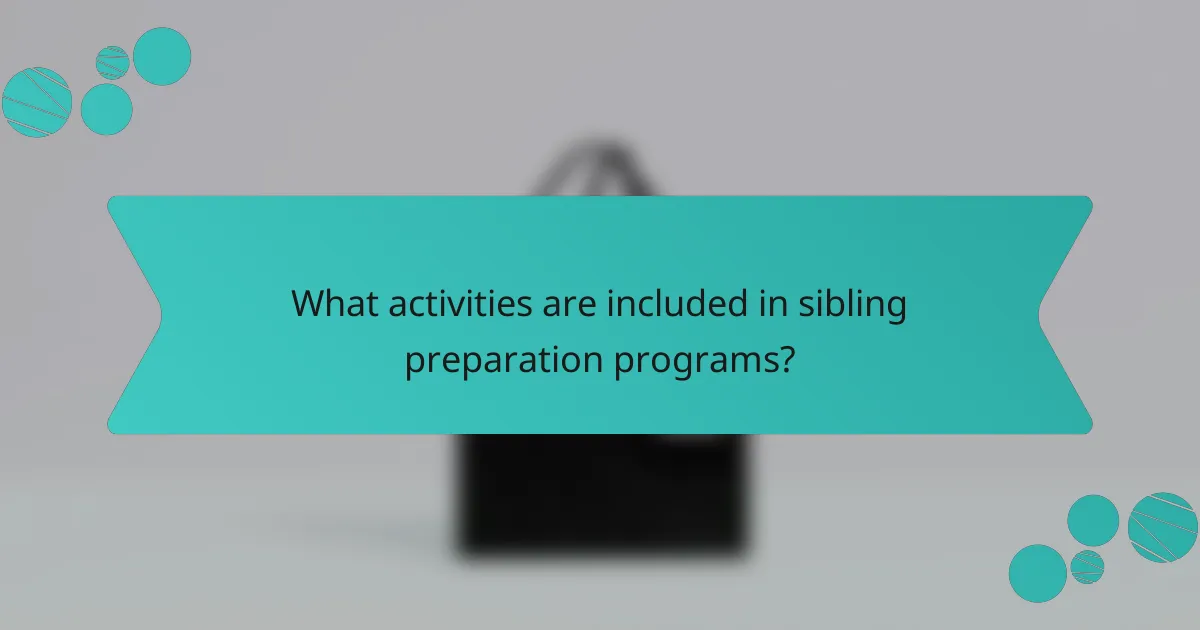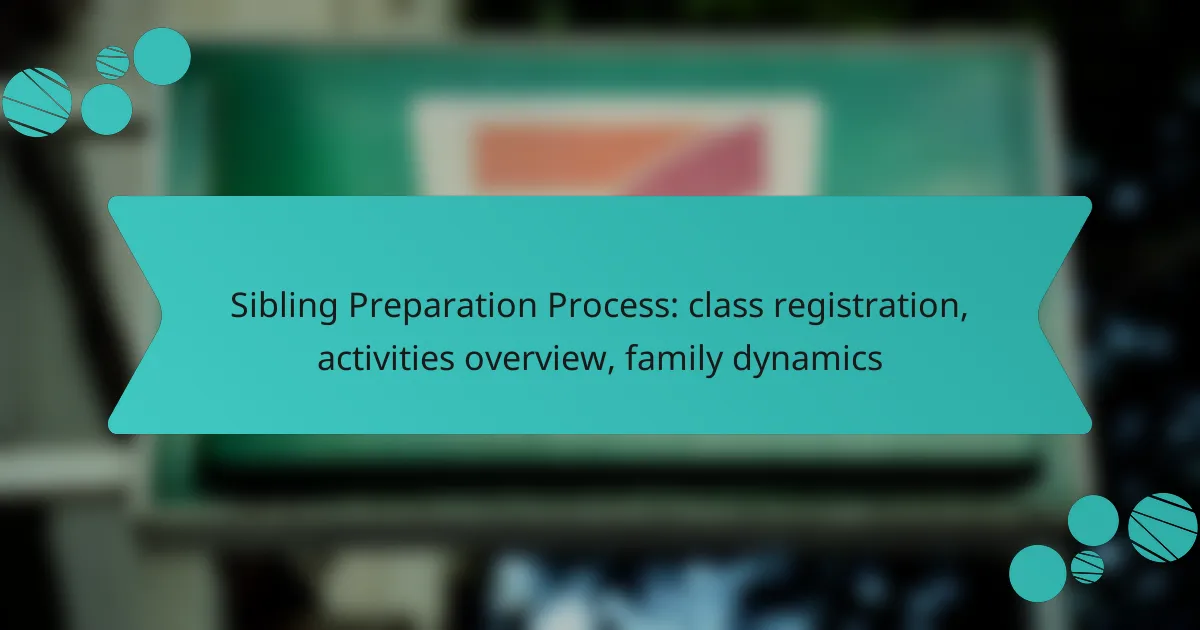Preparing for a new sibling can be an exciting yet challenging time for families. Sibling preparation classes in Los Angeles offer valuable resources through both online and in-person registration, helping children adjust to their new roles. These programs include engaging activities that promote education and bonding, while also addressing the emotional shifts that come with expanding family dynamics.

How to register for sibling preparation classes in Los Angeles?
To register for sibling preparation classes in Los Angeles, families can choose between online and in-person registration options. These classes help siblings adjust to the arrival of a new baby by providing them with essential information and support.
Online registration through local community centers
Many local community centers in Los Angeles offer online registration for sibling preparation classes. Families can visit the websites of these centers to find available classes, schedules, and registration forms. This option is convenient and allows for easy access to information from home.
When registering online, ensure that you have all necessary information ready, such as the child’s name, age, and any specific needs. Payment can typically be made through secure online methods, making the process straightforward.
In-person registration at family resource centers
Families can also register for sibling preparation classes by visiting family resource centers in Los Angeles. This option allows for direct interaction with staff who can provide personalized assistance and answer any questions about the classes. It may also be a good opportunity to learn about additional resources available for families.
During in-person registration, families should bring identification and any relevant documents. This helps staff ensure that the registration process is smooth and that families receive the appropriate support.
Registration deadlines and requirements
Registration deadlines for sibling preparation classes in Los Angeles can vary by center, so it’s essential to check specific dates well in advance. Generally, registration may close a week or two before the class starts, so early registration is advisable.
Requirements typically include completing a registration form and paying a fee, which can range from a nominal amount to a moderate fee depending on the center. Some centers may also require proof of residency or age verification for the child attending the class.

What activities are included in sibling preparation programs?
Sibling preparation programs typically include a variety of activities designed to help children adjust to the arrival of a new sibling. These activities focus on education, bonding, and practical skills, ensuring that siblings feel included and prepared for their new family dynamics.
Interactive workshops for siblings
Interactive workshops are a core component of sibling preparation programs. These sessions often involve hands-on activities where children can learn about their new role through play and discussion. For example, workshops may include role-playing scenarios or using dolls to simulate caring for a baby.
Parents should look for workshops that encourage questions and provide opportunities for siblings to express their feelings. Engaging activities can help reduce anxiety and foster excitement about the new arrival.
Family bonding activities
Family bonding activities are essential for strengthening relationships among family members before the baby arrives. These activities can include group games, storytelling sessions, or art projects that involve all family members. Such interactions help siblings feel valued and connected to their parents and the new baby.
Consider scheduling regular family time dedicated to these activities, allowing siblings to share their thoughts and emotions. This structured time can help ease transitions and build a supportive environment.
Educational sessions on newborn care
Educational sessions on newborn care equip siblings with the knowledge they need to understand and assist with the new baby. These sessions may cover topics such as diaper changing, feeding, and soothing techniques, often tailored to be age-appropriate. Parents can encourage participation by allowing siblings to practice with dolls or stuffed animals.
It’s beneficial to keep these sessions light and engaging, using visuals and interactive elements to maintain interest. Providing take-home materials can reinforce learning and give siblings a sense of responsibility and involvement in their new role.

How do family dynamics change with a new sibling?
Family dynamics often shift significantly with the arrival of a new sibling, impacting relationships and emotional roles within the household. Older siblings may experience a range of feelings, including excitement, jealousy, and anxiety, as they navigate their new position in the family hierarchy.
Impact on older siblings’ emotions
Older siblings may initially feel a mix of joy and apprehension about the new arrival. They might worry about losing parental attention or their established role as the sole child. These emotions can manifest as jealousy or regression in behavior, such as wanting to use baby items or seeking more attention from parents.
It’s crucial for parents to recognize these feelings and validate them. Encouraging older siblings to express their emotions can help them process their thoughts and fears, making the transition smoother for everyone involved.
Strategies for fostering positive relationships
To promote a healthy bond between siblings, parents can involve older children in the preparation process for the new baby. This could include letting them help choose baby clothes or toys, which fosters a sense of ownership and excitement.
Additionally, setting aside special one-on-one time with the older sibling can reassure them of their importance in the family. Simple activities like reading together or playing their favorite games can strengthen their bond and mitigate feelings of neglect.
- Encourage open communication about feelings.
- Involve older siblings in baby care tasks.
- Maintain routines to provide stability.

What are the prerequisites for sibling preparation classes?
Prerequisites for sibling preparation classes typically include age considerations and family involvement. These classes aim to equip siblings with the knowledge and skills needed to adjust to a new family dynamic.
Age requirements for participants
Age requirements for sibling preparation classes generally target children between the ages of 3 and 10. Younger children may require more simplified explanations, while older siblings can engage in more complex discussions about their new roles.
It’s essential to check with specific programs, as some may have tailored content for different age groups. For example, classes for toddlers might focus on basic concepts, while those for older children may include discussions about emotions and responsibilities.
Recommended family involvement
Family involvement is crucial in the sibling preparation process. Parents or guardians are encouraged to attend the classes with their children to facilitate discussions and reinforce learning at home.
Engaging the whole family can help siblings feel supported and understood. Activities that involve parents, such as role-playing or sharing experiences, can strengthen family bonds and ease the transition to welcoming a new sibling.

How to choose the right sibling preparation program?
Choosing the right sibling preparation program involves assessing the program’s content, structure, and how well it fits your family’s needs. Look for programs that provide engaging activities and support family dynamics to ease the transition for both the new sibling and the older child.
Evaluating program content and structure
When evaluating a sibling preparation program, consider the types of activities offered, such as role-playing, storytelling, and hands-on experiences. Programs should ideally include sessions that address emotions, expectations, and practical skills for interacting with the new baby.
Check if the program is structured to accommodate different age groups and learning styles. A good program may offer a mix of group activities and individual attention, ensuring that each child feels heard and supported.
Comparing local providers in Los Angeles
In Los Angeles, several providers offer sibling preparation programs, each with unique features. Look for programs that have positive reviews and experienced facilitators who understand family dynamics.
Consider visiting local community centers, hospitals, or parenting organizations to compare offerings. Many programs charge between $50 to $150 for a series of classes, so evaluate what is included in the fee, such as materials or follow-up support.

What are the costs associated with sibling preparation classes?
The costs associated with sibling preparation classes can vary widely based on the program’s location, duration, and specific offerings. Generally, families should anticipate tuition fees, potential material costs, and any additional expenses related to activities.
Tuition fees for various programs
Tuition fees for sibling preparation classes typically range from around $50 to $300 per session, depending on the institution and the length of the program. Some classes may offer a single session, while others provide a series of sessions that can lower the per-class cost.
For example, a local hospital may charge $75 for a one-time workshop, while a community center might offer a comprehensive four-week course for $250. It’s advisable to compare different options to find the best fit for your family’s needs.
Available scholarships and financial aid
Many organizations and institutions offer scholarships or financial aid to help families cover the costs of sibling preparation classes. These can range from partial discounts to full coverage based on financial need.
Families should inquire directly with the program providers about available assistance. Some hospitals and community centers may have specific funds allocated for this purpose, while others might partner with local charities to provide support.
